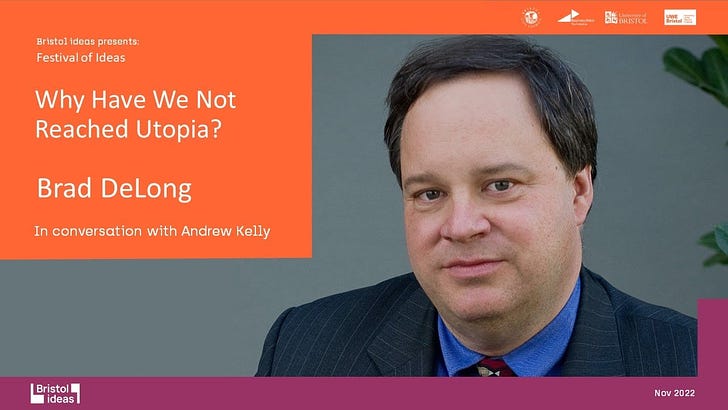CONDITION: Ahem!, Mr. Luce…:
This is wrong:
Ed Luce: US midterm elections: ‘Midterm defeats can upend US presidencies… sounded the death knell for the domestic agendas of Bill Clinton, George W Bush and Barack Obama…. The 2022 race belongs in a class of its own. Roughly half the Republicans running for federal or statewide office believe the presidency was stolen from Donald Trump in 2020. That means America’s system itself is on the ballot next Tuesday…
It is a lie to say that half the Republicans running for federal or state wide office believe the presidency was stolen from Donald Trump. Half the Republicans running for federal or state wide office knowingly falsely claim the presidency was stolen from Donald Trump. The difference between “believe” and “knowingly falsely claim” is not significant—in fact, it is very important.
Ed should have written differently. And one of his editors should have kept him from printing an untruth.
One Video: Brad DeLong & Andrew Kelly: Why Have We Not Reached Utopia?:
2022-11-02 We Bristol Ideas Festival
Why has the last century has left much of us vastly richer yet still profoundly dissatisfied.
Before 1870, most people lived in dire poverty, the benefits of the slow crawl of invention continually offset by a growing population. Then came a great shift: invention sprinted forward, doubling our technological capabilities each generation, and creatively destroying the economy again and again. Brad DeLong’s Slouching Towards Utopia: An Economic History of the Twentieth Century <bit.ly/3pP3Krk> tells the story of the major economic and technological shifts of the 20th century.
DeLong charts the unprecedented explosion of material wealth after 1870 which transformed living standards around the world, freeing humanity from centuries of poverty, but paradoxically has left us now with unprecedented inequality, global warming and widespread dissatisfaction with the status quo. Our ancestors believed that by now utopia would have been the inevitable result of such material wellbeing – instead of arriving at utopia we are slouching towards it.
In this conversation with Bristol Ideas’ Andrew Kelly, DeLong looks at the role of public understanding of the complexity of economics; writing grand narratives and the inspiration of Eric Hobsbawm; and the importance of editors. They discuss economic growth from 1870 in the great transformation; Mill, Keynes, von Hayek and Karl Polanyi; the great period of social democracy and welfare in the ‘Trente Glorieuses’ post-Second World War; the collapse of the New Deal Order and how it might have been saved; the impact of neoliberalism; and the challenges now and what to do next.
One Image: Stable Diffusion Is… Very Interesting Indeed…
Especially what it does with hats and architectural columns:
Oþer Things Þt Went Whizzing by…
Very Briefly Noted:
Alexandra Scaggs: A short history of rate hikes: Happy Fed Day everyone! Buckle up: As markets prepare for another 75bps rate increase from the Federal Reserve, Goldman Sachs have reviewed the historical rate-hike playbook for central banks in Group of 10 countries. It… isn’t entirely discouraging. It goes a little something like this: — hike until something breaks — try to fix whatever broke by cutting rates…
Joe Nye: The Evolution of America’s China Strategy: ‘While US President Joe Biden’s administration is right to question the basic assumptions that underlay America’s strategy of engagement with China, those who devised that strategy over two decades ago were also right in their own way. Then as now, even distant scenarios must be left open…
Jared Brey: Why Are U.S. Transit Projects So Costly? This Group Is on the Case: ‘Boston and New York in the high-cost category, and Stockholm, Italy and Istanbul in the low-cost category… politicization of project management… the expanding role of consultants, the costs of labor, and efforts to limit disruption to normal traffic…
Ben Thompson & Dan Wang: The China Chip Ban…
¶s:
Noah Smith: Twitter's problems: a roundup: ‘Elon Musk bought Twitter. Personally, I’m pretty sanguine about this development. It’s no secret that I think that Twitter is a uniquely dystopian feature of the modern media sphere a bad equilibrium that traps the nation’s journalists, politicians, and intellectuals in close quarters with all the nastiest and most strident anonymous bottom-feeders. There’s a nonzero chance Musk will be able to improve this situation; if not, it’s hard to see how he could make it particularly worse. If he destroys the platform, we’ll find something else — probably a number of different somethings, which I think would be good for the media ecosystem…. Twitter’s power of “cancellation” is boosted by another feature of the internet: permanence. Anyone who searches for your name will always be able to find those 200 people who got mad at you on Twitter. This means that “cancel culture” is different than traditional social ostracism, which you could escape by moving to a new town or by people forgetting a controversy over time…
Matt Yglesias: One Billion Americans — now more than ever: ‘We want a story to tell China and the world about a path to enduring American primacy that doesn’t involve keeping everyone else down. We know that China is already facing extremely stiff demographic headwinds. We know that lots of people from around the world would like to move to the United States. And we know that we have the capacity to do more to financially support parents of young children. We should try to address those issues in ways that are sensitive to conservatives’ concerns, but we should in fact try to address them and have more legal immigration and more of a policy tilt against the trend toward ever-fewer children. That doesn’t answer all the dozens of specific diplomatic, economic, military, and political questions posed by U.S.-Chinese rivalry, but it would put us on a fundamentally firmer footing. And now that the country is really committed to the rivalry, I hope more people can see that…
Michael O'Hare: What To Do On the Last Day of Class: ‘Any course… can have no more than five big ideas…. Mmy current last-day program…. Divide the class into small groups in some obviously random way…. Have each group gather to come up with a consensus version of the five ideas…. Have a scribe from each group come to the board and write the group's 5 ideas…. Have a brief discussion of "any surprises? anything especially interesting?”… Collect the group forms and post them as a PDF on the course web site…. Say goodbyes…. It's surprising and illuminating to see how varied the responses are (and reassuring that there's a fair amount of overlap); every student in the room actually experiences a different course, and I now have a much better idea of this distribution…







Big brain AI gave them skull faces since logically they are already deceased. Or Stable Diffusion is just bad at faces.